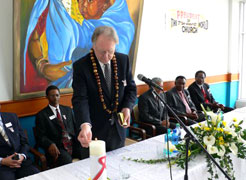On December 1, a day the world community recognized the challenge of HIV and AIDS, Pastor Jan Paulsen, world president of the Seventh-day Adventist Church reaffirmed the Adventist commitment "to an be active, and not a silent partner" in addressing what has become a curse for mankind.
As he arrived in Port Elizabeth, Pastor Paulsen was met by hundreds of Adventist believers and recognized World AIDS Day by lighting a symbolic candle.
Speaking at the airport, Pastor Paulsen said that HIV and AIDS "is a responsibility and challenge to find solutions, not only to South Africa, but for all humanity."
"We need to seek and find solutions in the scientific and medical area, in prevention, in training and in acceptance, within our communities, of those who are suffering."
"Our church is an active and not a silent partner in addressing the challenges of HIV and AIDS," Pastor Paulsen said. "We do what should be done in any community to prevent the spread of this curse. We do it also in training churches to be accepting of those who are suffering."
He said that "a church is where people come to be accepted, to be loved, and to have their human dignity recognized. We also come to church to find ... the future. The church must love them. The church must be supportive, positive, loving and accepting." He sees the church as an "active partner of this important ministry on Christ's behalf."
This is Pastor Paulsen's second visit to Port Elizabeth. In 1991, as chairman of a Commission on South Africa set up by the church's General Conference, he participated in a consultation with church members about merging two unions, restructuring them into one administrative unit for the country.
"We did that," Pastor Paulsen stated. "At that time it was a big step forward and it was a signal. But there are still more things to be done. We have still some distance to go and we have not completed the task as a church."
In a statement to the media, the world church president said, "the path toward unity in South Africa has not been easy. But it is a course that has been undertaken with courage and determination--with an undaunted belief in a better future for the children of your country. On behalf of the worldwide Seventh-day Adventist Church, I want to express my admiration and support for those, both within the government and the private sector, who are leaders in this cause."
"As we look around the world today we clearly see how hate and intolerance lead to violence and destruction. As a church, we believe that it is only by recognizing the dignity and worth of every human being that we can hope to build more peaceful communities," Pastor Paulsen added. He also stated "the Adventist Church is committed to working for peace and reconciliation by promoting tolerance and respect for fundamental human rights. I pray that the Adventist Church in South Africa will be a partner in this, that it will do all it can to foster harmony and understanding, and that it will be an instrument of reconciliation and healing within society."
Pastor Paulsen recalled that his first visit to South Africa was just after Nelson Mandela was freed from his imprisonment and a few years later became the country's president. Paulsen recognized Mandela as "an outstanding leader and symbol for integrity and morality in leadership not only for South Africa, but also for the world," and commended South Africa for the steps taken forward in the last 15 years by Nelson Mandela and his successor, President Thabo Mbeki. Paulsen commended the developments in South Africa where today its citizens "experience self-realization and honour equality of humanity."
He also referred to steps taken in South Africa toward eradication of violence. He commended the nation for "marking the importance of eradicating violence on the streets in the city, but also violence in the homes, as well as violence against women and the children. This we must never be tired of. Children and women are vulnerable in society, not only in South Africa, but also around the world. They need our special care and protection."
"I want to commend the state for the initiatives profiling these needs. I want to state this to the representatives of the public, and to our church members--we are talking about [issues] that are core values to the Seventh-day Adventist Church, and we will do our best in expressing support for these matters, and combating these ills of mankind," Pastor Paulsen concluded.
The South Africa itinerary for Pastor Paulsen includes participating in a spiritual convocation in Port Elizabeth on Sabbath, Dec. 2, and, in Pretoria on Dec. 4, opening the newly built headquarters for the Southern Africa-Indian Ocean Division, one of the world church's 13 geographical regions. On Sunday, Dec. 3, he will have the opportunity to participate in a "Let's Talk" conversation with a group of young church members from across Southern Africa, which will be broadcast live by satellite throughout Africa and Europe.
On his visit to South Africa Pastor Paulsen was hosted by Pastor L. M. Mbaza, president of the local Adventist Cape Conference. He was also accompanied by world church secretary, Pastor Matthew Bediako, Southern Africa-Indian Ocean regional president, Pastor Paul Ratsara and Francois Louw, president of the Southern Africa Union. [Editor: Rajmund Dabrowski for ANN/APD]

